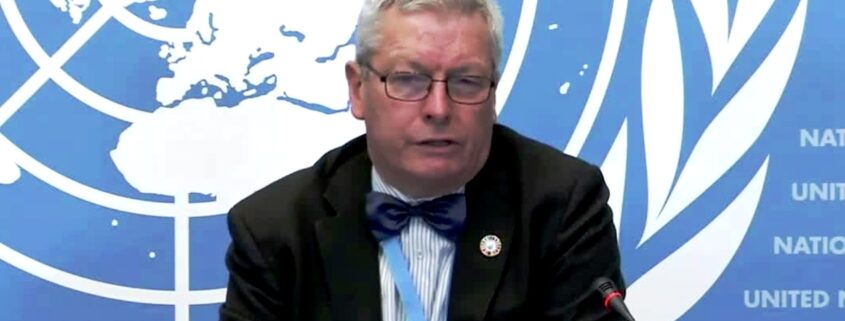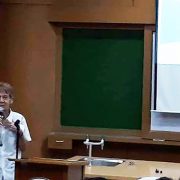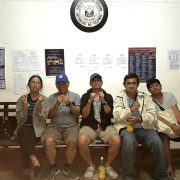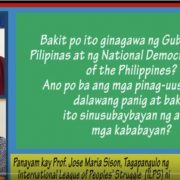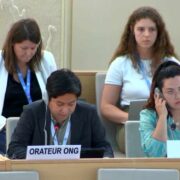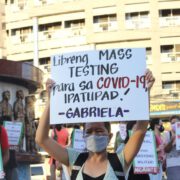UN report demands NTF-ELCAC abolition, anti-terror law repeal
The Philippine government is again urged at the international stage to abolish its counter-insurgency task force and repeal its controversial anti-terrorism law.
In a damning official report by the United Nations (UN) Special Rapporteur on the promotion and protection of human rights in the context of climate change, the Philippine government is once more asked to close down its National Task Force to End Local Communist Armed Conflict (NTF-ELCAC) and to repeal the Anti Terrorism Act (ATA, Republic Act 11479) it said are instruments of oppression against Filipinos.
Submitted to the ongoing 56th regular session of the UN Human Rights Council on Tuesday, July 2, by current mandate holder Elisa Morgera, the report was prepared by Ian Fry who visited the Philippines last November 6 to 15.
Fry said government attacks against civilians defending the environment are “blight[s] on the country and need to be urgently addressed.”
Fry, who resigned from the mandate last December, added he was “deeply troubled” by the treatment of environmental human rights defenders, particularly indigenous peoples.
NTF-ELCAC abolition
In his report, Fry reiterated his two strongest recommendations initially delivered in his exit statement last November, pointing out the role of the NTF-ELCAC and the implementation of the ATA in infringing on the rights of environmental defenders, indigenous people, peasants, women, and LGBTQ and other groups who oppose destructive mining and projects such as dams and reclamation projects.
“It is clear that the lack of control of the military and over-reach of its anti-communist agenda is having tragic consequences for people trying to peacefully defend their right to a clean, healthy and sustainable environment,” the report reads.
Fry added: “The use of intimidation, harassment, abductions, prosecution, jail sentencing and extra-judicial killings by the military based on trumped-up charges against human rights defenders is contrary to many international human rights obligations.”
The expert also said the NF-ELCAC is using its powers to protect economic interests that have nothing to do with anti-terrorism or anti-communism.
“The gross overreaction to people trying to defend their right to a clean, healthy and sustainable environment is totally unacceptable,” the report says.
Most vulnerable
Fry’s report noted that the Philippines is one of the most vulnerable countries in the world to the impacts of climate change that has significant implications on the enjoyment of human rights in the country.
He said that while the government has many policies and laws relating to climate change, it does not seem to want to implement them on the ground.
The report added that the Philippine development agenda, including the development of mines, hydroelectric dams and land reclamation projects, contradicts the highly fragile nature of the country.
Fry’s visit focused on loss and damage, climate change displacement, climate change mitigation, climate change legislation, litigation and intergenerational justice, the treatment of environmental human rights defenders, and gender equality.
Fry met with various government officials, UN agencies in the Philippines, civil society organizations and indigenous people’s organizations and communities in Metro Manila , Leyte and Iloilo province.
Number of victims increasing
Reacting to Fry’s report, human rights group KARAPATAN said it supports the UN mandate’s recommendations, revealing at least 112 human rights defenders have already been charged under the ATA and the Anti-Terror Financing Act (RA 10168).
“Thirty two of them are detained on trumped-up charges under these laws. Thirty two individuals, including peace consultants, indigenous rights defenders and a community health worker, have been arbitrarily designated as terrorists,” Karapatan said.
The human rights group added that the victims face threats to their lives, liberty and security, and right to free expression.
“Their ability to exercise their right to defend human rights remains curtailed, especially of those in prison. Instead of protecting people’s rights, the anti-terrorism law itself is being used to violate the rights of those it is supposed to protect – for instance, by charging activists with domestic violations of international humanitarian law and falsely implicating them in legitimate military encounters in the country’s armed conflict,” KARAPATAN said.
The group said that Ferdinand Marcos Jr.’s refusal to abolish NTF-ELCAC and continuing implementation of the ATA exposes his government’s hypocrisy on the human rights situation in the Philippines.
“Along with its stubborn adherence to the draconian policies of the past administrations especially the Duterte regime, its disinterest in pursuing justice for victims of human rights violations is clear and present proof of its fascist character and approach,” the group said.
KARAPATAN called on the international community to monitor the situation in the Philippines as well as extend solidarity to victims and communities. # (Raymund B. Villanueva)

